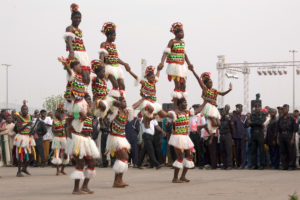 A Keynote Address by His Majesty, Nnaemeka A. Achebe, CFR, mni, Obi of Onitsha, Agbogidi, on the Occasion of the Twenty-fifth Anniversary Celebration of Anambra State, on October 3, 2016 at the Professor Dora Akunyili Women’s Development Centre, Awka.
A Keynote Address by His Majesty, Nnaemeka A. Achebe, CFR, mni, Obi of Onitsha, Agbogidi, on the Occasion of the Twenty-fifth Anniversary Celebration of Anambra State, on October 3, 2016 at the Professor Dora Akunyili Women’s Development Centre, Awka.
I stand here in great awe and trepidation before you all. The reason is simply that I feel totally unqualified for this important assignment. There are indeed so many Ndi Anambra that are more eminently qualified to do justice to the subject. Nevertheless, I will persevere to do my best since, in the words of our elders, “Oku agunyelu nwata na aka ada aru ya”. I should also add that I prepared this lecture on very short notice and am, therefore, open to debate or challenge on any points that I will make.
In an uncanny coincidence of dates for me, at sundown today, I will go into absolute seclusion preparatory to the annual Ofala Onitsha. This is a period of meditation and prayers to God through my ancestors for communal wellbeing. It is the time for atonement for communal misdeeds and supplication for blessings and good fortune in the period ahead. I trust that all will join me in this spiritual journey for the wellbeing of my domain, Anambra State, Ani Igbo, Nigeria, and indeed the whole world.
Twenty-five years, in some ways, may be considered small in the life of a State, such as ours. But in other ways, much has happened that is worthy of thankfulness to God, and celebration. Equally important is that such an occasion affords the opportunity to reflect on where we have come from, and presently are, as a basis for charting our future. That is what I will attempt in this presentation.
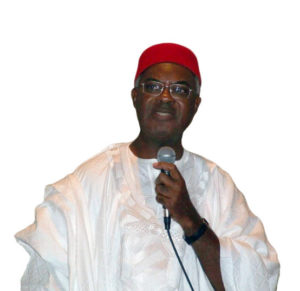
But first, I must commend our State Government under Chief Willie Obiano, Akpokuedike, for conceiving the anniversary events with the same vision that he has brought to bear on governance in the State. He is indeed a leader made for the present times and we pray that God continues to guide and guard him.
I was assigned the topic – Aku Lue Uno – but given full liberty to navigate as I may deem fit. Aku literally translates to “property”, “possession” or “wealth”. Uno translates to “home”, “abode” or “a place of refuge”. I shall explore later in this presentation the deeper meanings of these words as I make a case.
However, I should also warn from the onset that I may not be bringing much that is new to the table today, except perhaps a clear call on Ndi Anambra and Ndiigbo to urgent action. Nigerians, in general and Ndiigbo, in particular, are prone to much talk and insufficient action. There are endless commissions of enquiry, conferences and workshops, and lectures, such as this, that proffer endless recommendations for actions that have hardly been implemented. My hope and prayer is that we leave here today resolved that we must start acting in our own particular ways to uplift Anambra State and Ani Igbo using all available platforms – government, traditional institution, corporate bodies, entrepreneurs, town unions, churches, etc.
My presentation will be in three parts, namely, a sketch of the political and economic development of Nigeria from Independence to the last General Elections in 2015, the current situation in Nigeria and the Igbo situation in that context, and some views on the future direction for Ndiigbo.
Where We Came from Since Independence:
Our journey for today starts with Nigeria’s Independence in 1960, when the British colonial authorities bequeathed us with a Federal Government and three Regional Governments. The federal principle as agreed by our founding fathers was that the Federal Government derived its powers from the federating units, namely, the Regional Governments that negotiated the Constitution. The bases of power in that arrangement were political and economic.
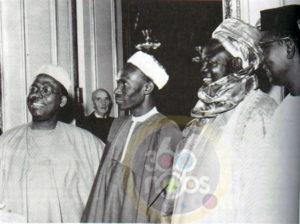
At the political level, the leaders of the three main parties, namely, the National Council of Nigerian Citizens (NCNC), Northern Peoples’ Congress (NPC), and Action Group (AG) in the persons of Ogbuefi Dr. Nnamdi Azikiwe, Sir Ahmadu Bello, and Chief Obafemi Awolowo, underscored that federal principle by opting to lead their Regional Governments, which were the source of political power, and sending their lieutenants, namely, Dr. K.O. Mbadiwe, Sir Abubakar Tafawa Balewa, and Chief S.L. Akintola, respectively, to lead the Federal Government.
At the economic level, the Regional Governments were the revenue collecting authorities and remitted the relevant quotas of the revenue to the Federal Government. The economic base of the country then was largely primary agricultural products and solid minerals, which originated fairly evenly from the three Regions.
The outcome of the above arrangements was that the three regions (subsequently four with the creation of Mid-West Region) competed healthily in terms of productivity and export earnings, as well as the deployment of the proceeds to sustainable development. Such competition was manifest in the areas of education, industries, infrastructure, etc, and cities such as Lagos, Ibadan, Kano, Kaduna, Port Harcourt, Aba and Enugu were emerging as major centers of development. Ndiigbo did very well in that setting. At the start of the civil war in 1966, Eastern Nigeria was ahead of the other Regions in overall economic development. Ndiigbo had become leaders in education (Kenneth Dike, Eni Njoku), public service (Francis Nwokwdi, Eneli), business (Odumegwu Ojukwu, Matthias Ugochukwu) and even the military (Ironsi). They had closed a whooping gap in human development and self-application, considering that the first university graduates of Igbo extraction emerged in the 1930’s whist the Yoruba were in the 1880’s.
One shortcoming of the foregoing arrangement was that the major political parties soon became entrenched in a regional base, respectively, such that the country’s political fault lines progressively became co-incident with our ethnic, social and religious divides thereby setting the scene for the subsequent tension and termination of the true federal system in the hands of the Armed Forces in 1966. Indeed, the nonagenarian, Sir Olaniwun Ajayi, argued with material evidence in his book, Nigeria, Africa’s Failed Asset? that the country was designed by the British colonialists to be permanently controlled by a preferred section, or otherwise ultimately fail.
The military coup d’état, which supplanted the democratically elected government of Sir Tafawa Balewa, triggered a series of events that culminated in the pogrom against the people of Eastern Nigeria, mainly Igbos, in various parts of Northern Nigeria. This, in turn, led to the retreat of the Igbos back to the Eastern heartland, the proclamation of the Independent State of Biafra, and the Nigerian civil war, which ended in 1970. Several measures, which were taken by the military regimes through decrees and constitution making before, during, and subsequent to, the civil war, set the scene for the political and economic development of the country since then. Here are some examples:
Firstly, the military regime under General Yakubu Gowon abrogated the Federal Constitution, affirmed the supremacy of the Federal Government over the Regional Governments, and subsequently reconstituted the four Regional Governments into twelve States headed by Military Governors that were directly answerable to the Supreme Military Council headed by the Commander-in-Chief of the Armed Forces.
The concentration of political power in the Federal Government was naturally accompanied by the reversal of the erstwhile revenue arrangement. The ownership of mineral resources became centralized in the Federal Government, which, in turn, made revenue allocation to the States. The incursion of the Armed Forces into governance, unfortunately, coincided with the emergence of petroleum as a major export income earner for the country, driven by growing international demands and rising prices for the commodity. Indeed, this development led many observers and analysts to speculate that the discovery of petroleum deposits predominantly in the then Eastern Region may have been a remote cause of the civil war.
Secondly, also unfortunately, the emergence of petroleum as a major export income earner has so far proven to be a course rather than a blessing for the country. For instance, the easy rent from petroleum made the country to progressively abandon agriculture as a means of subsistence and export income and become net importers of food, particularly rice and wheat, industrial inputs, such as palm oil, as well as endless frivolous luxury items. Over time, the nation became consumption driven instead of production based.
The country was generating income from petroleum exports much faster than could be sustainably deployed for development by the regime. This led to a measure of profligacy by the government with such projects as the FESTAC and the African Scouts Jamboree, which were so monumental that no other country has dared to follow our example as host. There were also the embarrassing armadas of cement, rice, fertilizer, champagne, etc. Indeed, our Head of State at the time was quoted as saying that money was not a problem, but how to spend it.
Thirdly, though the original creation of twelve States was couched as a strategic measure to forestall the breakaway of the Eastern Region, the appetite for new States and Local Government Areas began to grow because the military regimes made the States and the LGAs the basis for Federal allocation of revenue, amenities, public appointments, etc. Ironically, the Igbos of the post-war East Central State were the last to realize the game, having initially resisted any further breakup of the East Central State. Thus, with the present 36 states, 774 Local Government Areas, and six geo-political zones in the Federation, the Southeast Zone became marginalized with only five States against six each in four other Zones and seven in the Northwestern Zone. They feel similarly marginalized on the allocation of LGAs.
Fourthly, the extant Constitution of 1999 crafted by the military regime is merely an entrenchment of the unitary government that has evolved since 1966. The Constitution is merely federal by name considering that the existing 36 States are collectively weaker than the original three (four) Regions. The military elites and their civilian collaborators theorized that the constituent nationalities must be weakened and even subdued in order to build Nigeria into a united country in the self-image of that oligarchy and under their permanent control. However, notwithstanding the inherent weaknesses and near bankruptcy of most of the existing 36 States, there remains a yearning cry for the creation of more States solely for the purpose of revenue allocation from the federation account. In the present situation, the head of the Federal Government wields enormous powers over the nation’s wealth, including budgetary allocations to the other arms of government, namely, the Judiciary and the Legislature.
Fifthly, the worst impact of the military regimes was on the subsequent political culture of the country. The nation’s political parties leading up to Independence were founded on distinct ideologies. They presented well-articulated manifestos during general elections, which became the basis for their strategies and policies for governance. Unfortunately, the political culture of the country since the end of the military regime has become predicated solely on the control of political power at the Federal Government which, by implication, amounts to the control of the petroleum earnings. The political parties jettisoned ideologies and manifestos, which are essential differentiating characteristics in democracy. Rather, they have become shifting coalitions for achieving sectional and personal interests rather than the common good of the nation. Thus, political players now switch platforms and alliances at will as long as they can find themselves within the corridors of power with access to a piece of the fast diminishing national cake. But, such political parties founded on the basis of personal or sectional interests are ultimately bound to implode due to internal collisions of such interests. The People’s Democratic Party (PDP) did so after 16 years in office. The All Progressives Alliance (APC), now in power, is already challenged by internal issues to the discomfiture of the whole nation.
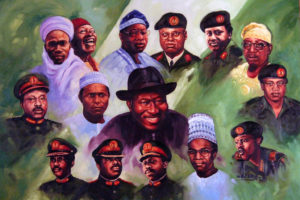
Finally, impunity in public life became rife. There have been stories of monumental fraud, for example, regarding the Police Pension Fund, fuel price subsidy, military procurement funds, etc that have been endlessly prosecuted without people being convicted and jailed. We hear glaring news of high profile arrests and endless investigations with hardly any convictions.
Today, it has become crystal clear that the governance framework put in place by the military regimes were self-serving and doomed to fail. A system that replaced the zeal for hard work and creativity with the scramble for rent from petroleum resources, which thereby created colossal corruption, inequities and waste, and consequent agitations in the forms of Boko Haram, MASSOB /IPOB, MEND/NDA, etc, a system that created inherently weak States with massive bureaucracies, and a system that fostered an import dependency syndrome instead of a home grown diversified economy, was bound to fail. And it failed!
But the question remains what the succeeding civilian political class has done, or is doing, to reform the ineffective system? Despite two national conferences (President Obasanjo in 2005 and President Jonathan in 2014) and endless attempts by the Federal Legislature to amend the 1999 Constitution, the answer remains doubtful.
Where We Are Since 2015 General Elections:
We will now fast track to the period leading to and since the last general election in 2015. As stated earlier, the PDP, which inherited power from the last military regime, had ruled for sixteen years. That coalition of interests had progressively come under internal stress, leading to many of its prominent members leaving to join an alternative coalition of interests in the APC. Life had become more difficult for most Nigerians whilst the ruling PDP was weighed down by internal governance issues. It was in this situation that the APC, under the mantra of “Change”, prevailed and won the general elections without dispute. In the process, the party’s articulate propaganda machinery created undue impressions and expectations that change would be imminent and prosperity would return soonest. On the contrary, it has been a slow grind since the present regime came into office.
On the one hand, the new regime claimed that it needed much time to assess the substantial challenge it met on arrival and to implement effective policies and strategies for moving the country forward. It has also given some impression of discarding or modifying some of its campaign promises. On the other hand, its critics assert that the ruling APC made clear, assertive, and definitive promises during the election campaign and must be held accountable to deliver on those promises. The truth is probably somewhere in-between, namely, that, while the new regime should not be expected to perform instant magic over the collective economic and social rot that it inherited from successive regimes, it could have initiated some immediate palliative measures to assuage the expectations of the governed. This position was articulated by Asiwaju Ahmed Bola Tinubu in his open letter to the Honorable Minister of State for Petroleum over the fuel supply crisis.
In practical terms, however, several basic human development indices have deteriorated since the new regime came to power, including fuel supply and pump prices (since addressed), exchange rate for the Naira, the stock market, electricity supply, unemployment, business closures or downsizing, inflation, unpaid workers’ salaries, etc. This has led several respected statesmen and personalities to raise their voices on the looming economic dangers. On 24 August, the Emir of Kano, Alhaji Sanusi Lamido Sanusi, made a statement in Kaduna that, though he was a friend of the present administration, he would become the opposition if the administration decided to run Nigeria aground. Two days later at a different forum in Kaduna, Professor Chukwuma Soludo said that President Buhari had not come to terms with the economic realities of the day, as he has failed to combat economic challenges confronting the nation. Still on 29 August, Anthony Cardinal Okogie added his voice by writing an open letter to Mr. President saying that the “cries of ‘hunger’ could be heard across the length and breadth of our vast country”. He added that Nigerians hungered “not only for food, but also for good leadership, for peace, security, and justice” On 31 August, the National Bureau of Statistics issued its half year report indicating that the country was in an economic recession that was much worse than expected.
The immediate challenges faced by the Administration has also resuscitated the feeling across the country and the political divide for a review of the governance structure of the country since the present arrangement has proven to be unworkable. One such voice is Alhaji Atiku Abubakar, former Vice-President under the PDP regime of President Olusegun Obasanjo and now a chieftain of APC. On 01 June, 2016 he stated that “Agitations by many right-thinking Nigerians call for a restructuring and renewal of our federation to make it less centralized, less suffocating, and less dictatorial in the affairs of our country’s constituent units and localities”. He added that “Our current structure and the practices it has encouraged have been a major impediment to the economic and political development of our country”. Early in September, the Southwest zonal conference of the APC called for the restructuring of the country and that “governance should be based on true federalism”.
Also, on 17 September, a former Chief Justice of Nigeria, Justice Dahiru Musdapher, said at a lecture in Abeokuta that “the 2015 Presidential election further divided the nation, as the election was marked by demarcations along ethnic, regional, partisan, and religious lines”. He added that “Nigerians seemed as divided as ever”, and “I am deeply worried . . .the situation is grave”
On their own part, separatist movements, such as IPOB/MASSOB in the South East, MEND/NDA in the Niger Delta, and the Lower Niger Congress spanning both geo-political zones, have declared a total loss of faith in Nigeria as constituted, and have therefore called for complete secession.
Against these foregoing views and positions, President Muhammadu Buhari has been quoted in the media as saying that the recommendations of the 2014 Constitutional Conference for far reaching constitutional changes to assuage much of the agitations in the country should be consigned to the archives. His posture notwithstanding, it should be stressed that the present gargantuan challenges in the country are not the making of this immediate administration, but rather a culmination of the collective mismanagement by the previous administrations since the military came into governance. This should be good reason for Mr. President not to be defensive, but rather to lead the country in an open engagement to re-negotiate a mutually acceptable future and restore the country on the path of optimum development.
Summing up the views and arguments that have been espoused regarding the future of the country, three scenarios seem to emerge, as follows:
1. Retain the existing political and economic structure of 36, or even more states and strive for more efficiency through internal reforms. This position is strongly held by the powerful military-civilian oligarchy, which has dominated the governance of the country since the military regimes began. It is the same oligarchy that bequeathed the nation with the 1999 Constitution. As stated earlier, proponents of this perspective argue that the only way to make Nigeria a united country would be to weaken, subdue or even destroy its constituent nationalities, including their languages, culture, history, etc. Thus, by concentrating power in the Federal government, the oligarchy would retain permanent control or stranglehold over politics and governance in the country.
2. Restructure the country on the basis of the six geo-political Zones as the federating units, which would have adequate political and economic powers similar to the provisions of the Independence Constitution. This position was well articulated in a lecture by Professor Banji Akintoye during the celebration of the 90th birthday of Chief Reuben Fasoranti by the Pan-Yoruba Group, Afenifere, in May this year. He said: “ . . . We Yoruba have always advocated that the Constitution of Nigeria should respect the nationalities of Nigeria . . . so that as much as possible, each of our nationalities may manage its unique concerns in its own way and . . . make its own kind of contribution to the overall prosperity of the nation”. This was similar to the views of Alhaji Atiku Abubakar quoted earlier.
3. Break the country up or allow for secession as advocated by the separatist movements. Members of IPOB/MASSOB argue that the youths of South East origin are constitutionally marginalized vis-à-vis their counterparts from the rest of the country as a consequence of the Civil War that took place before they were born. They argue, therefore, that the country in its present configuration will perpetually relegate even the unborn Igbo children to second class status in their own country. Therefore, they demand for a separate nation. MEND/NDA argue that the proceeds from petroleum, which emanates from the Niger Delta region, are controlled by a powerful group under the umbrella of the strong Federal government to the disadvantage of their own indigenes. They claim consequently that only a separate existence would guarantee control over the resources from the area and genuine development.
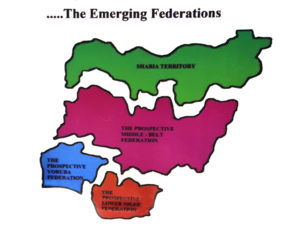
In life, there is a natural tendency for one to always seek to actualize a preferred scenario. However, prudence and common sense dictate that one ensures one’s survival under the most likely scenario at a given time. Two broad questions immediately arise for Ndiigbo, namely:
- Taking account of the present and foreseeable developments in the country, what is the preferred scenario for Ndiigbo, and are we working towards its realization?
- More importantly, what are the likely scenarios for Nigeria, going forward, and are Ndiigbo ready for survival under any eventuality?
In his lecture mentioned earlier, Professor Akintoye also stated that “. . . we Yoruba have very unique clarity and focus about the country we want, and deserve to belong to. . .”. It is noteworthy that this same position had been articulated by the Yoruba some twenty-two years earlier. As reported by Eric Teniola in the Vanguard newspaper of 28 August, a meeting of all the Yoruba Obas, chiefs, leaders of thought, and the entire people of Lagos, Ogun, Ondo (including the present Ekiti), Osun and Oyo States on May 11, 1994 in Akure approved by acclamation a memorandum signed by all the leaders in which they declared that “We are convinced that that the cause of Nigeria’s federalism will be well and truly advanced if we return to the pre-1966 evolutionary path: a balanced federal structure, which recognizes fully the legitimate claims of all ethnic groups for self-determination and where no single entity among the federating units will be strong or powerful enough to hold the others to ransom . . .”
It is quite clear from the foregoing that the Yoruba are unequivocal about their preference and have consistently canvassed it at every opportunity. Despite that, they have, nevertheless, been realistic to survive well under all the regimes. Besides, they have achieved sufficient internal consistency to enable them successfully exist as a sovereign entity, should that option become the order of the day. They have concentrated their economic assets within their Zone whilst always maximizing their political space at the Federal level.
The Igbo situation was, on the other hand, placed in stark context during the last general elections by my royal brother and close personal friend, His Majesty, Oba Rilwanu Akiolu, CFR, Oba of Lagos, when he was quoted to have threatened to invoke the wrath of the gods of the Lagos Lagoon on the Igbos resident in his domain. Unfortunately, a large part of Ndiigbo exploded in anger over that statement rather than try to contemplate its hidden meaning. He was, in effect, telling Ndiigbo in Lagos that they have become hostage to their own choices of concentrating their immovable assets in Lagos State and, therefore, may be unable to exercise their political rights without detriment to their commercial and economic interests. Paradoxically, he was doing Ndiigbo a great favour by drawing attention, once more, to our self-imposed vulnerability. He was indirectly calling on us to urgently address our readiness to survive as a people under any circumstance. I should add that I know Oba Akiolu as a clean-hearted and Godfearing man, who is very supportive of and gets along well with Ndiigbo in his domain.
At this point, let us examine the current political, economic, and social standing of Ndiigbo in Nigeria. Politically, we are the most widely dispersed ethnic group in the country. We, arguably, comprise the second largest ethnic population, next to the indigenes, in literally all other states in the country. Yet, we display such high levels of political apathy that our collective impact is hardly felt. Today, the Southeast is the only Zone in the country where three respective political parties (APGA, PDP, and APC) control State Governments. Instead of being a factor for healthy competition and strength, it has become a burden because trust does not anymore exist among our leaders in government. The Southeast Governors’ Forum is not functioning, our federal legislators (largely PDP and APGA) are not in dialogue on matter of Igbo interest with our federal ministers (all APC), and those at the federal legislative and executive positions are hardly sufficiently in touch with our political leaders at the state level. Furthermore, it is common knowledge that election tribunals thrive widest and longest in the Southeast compared to the rest of the country. Consequently, we have let political partisanship transcend our common heritage and unwittingly allowed outsiders to determine our political fortunes in the country.
Economically, Igbo assets are similarly dispersed more widely around the country than other ethnic nationalities. We tend to be long-term settlers in other people’s domains along with our immovable assets. In contrast, there are hardly any small or medium scale businesses by other ethnic nationalities in Alaigbo. Even the cattle from the North is mobile and easily sold for cash. Lagos State today dominates the Nigerian economy to the tune of over 60% and Igbos are estimated to comprise over 50% of the Lagos State economy. The same may be the case in Abuja. There are estimates also that Igbo business interests outside Alaigbo far exceed our investments at home. These are disturbing situations whose long-term sustainability should be rigorously tested against all the possible scenarios for Nigeria. Do these highly successful individual business decisions fit into a distinct philosophy, ideology, or strategy of life for Ndiigbo? What is that philosophy, ideology or strategy? Do we need one, and how soon do we evolve it?
For the Sociocultural consideration, we will borrow the term, “Global Tribe”, coined by a social scientist, Joel Kotkin in his book, Tribes: How Race, Religion, and Identity Determine Success in The New Global Economy. Kotkin identified ethnic groups that display the ability to hold common interests whilst dispersed around the world. The quintessential global tribe is the Jews, but also the Anglo-Americans, Japanese, Chinese, etc, have become successful global tribes, whilst we, the Igbo, have been seen as a potential global tribe. But, do we have, or can muster, all the attributes necessary for success in that regard? For instance, all successful global tribes have a solid home base from where they spread influence to the rest of the world. They emphasize community, instead of self, and tend to produce focused leaders as rallying points in various aspects of life, such as politics, business, education, etc.
The situation of Ndiigbo today is in contrast. Our individualistic competitiveness is both an advantage and disadvantage at the same time. Thus, whilst we successfully own myriads of small and medium scale businesses, we tend not be successful in cooperating to form large businesses. Our competitiveness starts from within our own fold with attendant distrust and friction. We tend to think and act “me” not “we/us” and “self”, not “community”. Our apex organizations, such as Ohanaeze and World Igbo Congress (WIC) are constantly mired in controversy even as Ndiigbo appear to have more socio-cultural-political organizations than the rest of the country collectively. Our traditional institution is equally confusing, to put it modestly. From a few traditional stools prior to Independence, Ndiigbo now have about half of all traditional stools in the country and the number is still growing. We may also have the distinction of being the only ethnic nationality in the world with persons parading as self-created “monarchs” in other people’s domains! Also, we do not appear to be sufficiently selfless with our wealth. For instance, there are only eight privately endowed universities in the Southeast out of 61 in the country; most of the eight have been endowed by church organizations. Ogun State alone has 18 universities!
Overall, the message from the forgoing is that the Igbo nation currently manifests serious ambiguities, contradictions, dilemmas and paradoxes. We appear by our own choices not to be heading in a consciously clear and defined direction as a people. Rather, we are, as ever, driven by choices, which may be individually successful but are collectively sub-optimal for the Igbo nation. On the other hand, other ethnic nationalities that share the Nigerian space with us, such as the Yoruba, are increasingly focusing on optimizing their group interests as their ultimate guarantee for individual and sectional comfort and security. This situation demands the most urgent attention of Igbo leadership at all levels and platforms.
What Does the Future Hold; Where Do We Direct Our Course?
In the first part of this lecture, I have argued that the 1966 military coup and subsequent events truncated the short-lived scope for separate development by the erstwhile Regional Governments and constitutionally marginalized Ndiigbo ever since. In the second part, I have argued that Ndiigbo have further complicated their situation and become rudderless as a people through their individual choices which, though often successful, have tended to ignore or relegate the Igbo collective interests. With this background, I will now explore the way forward for Ndiigbo. In the process, I will put forward my personal feelings.
Firstly, I truly and firmly believe that the long-term interests of Ndiigbo would best be served in a Nigeria that is just, equitable and provides adequate safeguards and scope for individuals and ethnic nationalities to freely realize their aspirations as well as contribute their quota to the overall development of the country. Such a situation would best be achieved by restructuring the country into a true political and fiscal federation based on the existing six geo-political Zones and the pre-1966 Constitution. Such an arrangement would afford the best platform for Ndiigbo to actualize their character as “Oje mba enwe ilo”. I believe that Ndiigbo should articulate this viewpoint, canvass it accordingly, and work in concert with other like-minded ethnic nationalities to actualize it. The recommendations of the 2014 Constitutional Conference provides a good starting point for considering this option.
Secondly, yields on investments in the short term may be higher outside Alaigbo than within. However, this is unlikely to remain the same in the medium to longer term if the present and future political risks are duly factored into the investment decisions and business plans. Commercial prowess and economic strength can never eliminate environmental and political risks and the envy of being seen as a successful stranger in someone else’s domain unless and until a more equitably negotiated country is achieved.
Thirdly, Ndiigbo must be prepared to engage in such a re-negotiated arrangement from a position of strength in order to achieve a satisfactory outcome. Whilst encouraging political partisanship, we must come together to define and champion an Igbo fundamental agenda that transcends political partisanship. That is the purpose of Afenifere for the Yoruba and should be of Ohanaeze for Ndiigbo. Economically, Ndiigbo should progressively diversify their business investments and assets homewards so as to transform the Southeast, as soon as possible, into the economic power base to underpin their business interests all over the world. No people can achieve greatness and respect in the comity of nations based solely on their prowess in the Diaspora. This was the realization that prompted the Jews to seek for a homeland after wandering the world for centuries, achieving success, and being despised and persecuted until Israel was created in 1948. Ndiigbo have a beautiful, God-given homeland. Let us develop it and be proud of it!
Fourthly, Ndiigbo must, in the meantime, not fold their hands waiting for their preferred scenario for Nigeria to materialize, but must continue to strive for the best under prevailing circumstances and likely scenarios. My views on this point are well-aligned with those expressed in a recent article in This Day newspaper of 28 August, 2016 by Simon Kolawole. He admonished Ndiigbo that “The wise thing . . . is to look within and see how Igboland can be far better than it currently is. . . The governors are in a good position to call on the best brains for the development of the Southeast, with or without Abuja. To start with, the Igbo have distinguished themselves all over the world in virtually every field of human endeavor: science, technology, creative industries, law, sports, commerce, education, journalism, medicine, etc. Therefore, I don’t believe anybody is doing the Igbo any favour by giving them appointments. But that is not the point. Who says Aba cannot become Taiwan without leaving the Nigerian zoo? Who says Nnewi cannot assemble 10 million mobile phones per year — without confederalism? No electricity? True. But many parts of Lagos are powered by IPPs, not PHCN. It can be done! Billions of dollars are crying to be tapped in Igboland!”
The recent visit by Mark Zuckerberg, the founder of Facebook, kicked off an online debate amongst Igbo intellectuals, spearheaded by a son of Anambra State, Chukwuemeka Fred Agbata, who is a key player in Information Technology development in this country. The consensus from the debate was that, whilst Ndiigbo have globally accomplished persons in the field, such as Philip Emeagwali, Chinedu Echeruo, and Pius Okigbo, Jnr, Yaba in Lagos, not Ani Igbo, is emerging as the first genuine IT/ecosystem hub in Nigeria due to the foresight of the Lagos State government to invest to create the enabling environment many years ago. In that debate, another Igbo son, Chinenye Mba-Uzoukwu, cited two interesting examples, Israel and India, for our study and emulation. On Israel, he quoted from a book, Start-up Nations: The Story of Israel’s Economic Miracle, by Dan Senor and Saul Singer, which asked the trillion-dollar question: “How is it that Israel – a country of 7.1 million, only 60 years old, surrounded by enemies, in a constant state of war since its founding, with no natural resources – produce more start-up companies than large, peaceful, and stable nations like Japan, China, India, Korea, Canada and the UK?”. On India, he quoted from another book, India Unbound: The Social and Economic Revolution from Independence to Global Information Age, by Gurcharan Das, which said that “India today is a vibrant free-market democracy, a nation well on its way to overcoming decades of widespread poverty. The nation’s rise is one of the great international stories of the late twentieth century”.
We must at this stage ask the question: How do Ndiigbo proceed into the future from their present fragile and worrying situation? First, we must admit, in all honesty, that we have not fared as well as we deserve from the Nigeria project so far. We placed too much trust and reliance, and still do, on Nigeria and received inadequate rewards. We have become hostage in other people’s domains and collective victim of our individual choices. It is in this context that we should re-visit the lecture topic for the day.
We know that our ancestors considered wealth and prosperity in more than material terms, hence they bequeathed us with such names as “Nwa ka ego”, “Ezi afa ka ego”, “Obi ajulu”, and “Madu ka aku”, etc. My late father often admonished my siblings and I that “Enwerom ego mana abum ogalanya. Ogalanya bu afo ojuju”. The Igbo meaning of “aku” and “uno” therefore transcends the strictly material and includes such other dimensions as pedigree, reputation, social standing, happiness, contentment, family unit, community, etc. Thus, we should see a deeper and more sublime philosophical context to our subject, reflecting an elevated or lofty state of mind and attitude, which also encompasses the physical and material dimensions. Consequently, my simplistic understanding of “Aku Lue Uno” is a clarion call on Ndiigbo to evolve a philosophy, ideology, strategy, and action plans for self-actualization through self-sufficiency, self-reliance and contentment, under any circumstance. This brings to mind the opening stanza of my secondary school anthem which admonishes to “Remember where you come from, wherever you may chance to go”. It took the Jews centuries to restore their homeland. Ndiigbo have a homeland. Let us develop it in our own image!
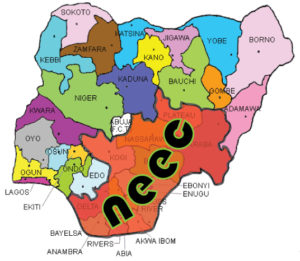
In response to the foregoing, I would offer the following non-exhaustive proposals for Ndiigbo with some specific references to Anambra State:
- We must start by re-establishing the core moral, social and cultural values for Ndiigbo: belief in God, self-reliance, hard work and meritocracy, communal well-being, transparency (Ezi okwu bu ndu), contentment (Afo ojuju), justice, equity (Egbe belu, Ugo belu), common destiny (Ofu obi), etc. We must deploy our language, history, and cultural norms and practices as cohesive and distinguishing factors, starting from the family settings at home to primary school levels, and onwards.
2. We urgently need an attitudinal change. We tend to be too loud, too boastful, and too immodest, even in other peoples’ domain. We must learn to respect the sensibilities of our host communities as much as we would expect them respect ours (Oje mba enwe ilo). This should be without prejudice to our self-pride and dignity, which should be tempered with modesty. In this regard, an Igbo intellectual and public commentator, C. Don Adinuba, has drawn attention to Professor Joseph Nye’s strategy of “soft power” or “smart power”, which entails Ndiigbo going on a charm offensive as the Jews have successfully done in the USA.
3. As part of the attitudinal change, we need to be more discreet in discussing our affairs in the public domain. We tend to hang our dirty linens in the public far more than others. The country is currently in a competitive mode. We must, therefore, not unduly expose our strengths and weaknesses, strategies and tactics, etc (Ife dike g’eme diya n’obi!).
4. We need to balance our individual competitiveness with a collective cooperative/communal spirit within and beyond our homeland in order to withstand outside threats (Igwe bu ike; Onye ayana nwanne ya).
5. We must seek to widely provide excellent and functional education as the solid foundation for human development (Amam ife; Ako na uche). This should emerge from effective tripartite dialogues and cooperation between government, educational institutions and the private sector in order to commercialize the numerous research findings and prototypes from our tertiary institutions. Our relative advantage in this sphere is fast receding and must be urgently restored. Excellence! Excellence!! Excellence!!!
6. Food sufficiency is the foundation for sustainable development. This is an important first step towards self-reliance and contentment. Omambala and Ogbaru basins are natural settings for agro-allied businesses with emphasis on growing the value chains.
7. Energy sufficiency is an absolute prerequisite for sustainable industrial development. Anambra State arguably has the largest number of successful entrepreneurs, professionals, and managers in Nigeria’s upstream petroleum sector (Arthur Eze, Emeka Offor, Ernest Obiejesi, Uju Ifejika, Emeka Okwuosa, etc). They should come together and make Orient Petroleum a reality, including the refining and allied industries and power generation. It is disheartening that out of desperation, the company may now be on the verge of ceding a large chunk of its equity to foreign interests. Where is our self-reliance?
8. We must create the enabling environment to attract (Igbo and non-Igbo) investment to the Southeast: safety, security, infrastructure, enabling laws including taxation, the civil service, land reform and availability, communal and inter-communal peace, etc. In this regard, we again sincerely applaud Governor Willie Obiano for the best security strategy in the country and setting up ANSIPPA as a one-stop center for investment facilitation. ANSIPPA’s scope to meet the expectations of investors is limitless and should be pursued with single-minded zeal.
9. The Nnewi-Onitsha axis should be transformed into a bustling industrial hub taking advantage of the Onitsha Inland Port, which should be made functional by dredging the River Niger for access by flat bottom barges.
- We must grow prosperity at the lowest rungs of the society through Small and Medium Scale Enterprises, particularly amongst young graduates from tertiary institutions. The SMEs are the bedrock of strong economies in the world! Again, Anambra State has made a good start with the Anambra State Small Business Agency (ASBA), from which 70 of my indigenous young entrepreneurs have recently benefited.
- Information and Communication Technology (ICT) is the driver of the 21st century world. The Lower Niger/Anambra River basins complex offers an ideal setting for development for residential, recreational and industrial complex based on technology; that is, our own Silicon Valley!
- We must encourage the emergence of a new breed of leaders in all fields (politics, industry and business, education, etc) that would lead with modesty, humility, and commitment to service and the common good. The younger generation must rise fast to assume greater responsibilities. The future is theirs.
I have not put these idea forward as if nothing has been happening in Anambra State or Ani Igbo. Indeed, the contrary is the case. In Anambra State, we all are witnesses to the laudable strategic initiatives of Governor Willie Obiano in most of the areas mentioned above, including the roles of ANSIPPA, ASBA, etc. What we are saying, however, is that Anambra State and Ndiigbo have limitless scope and wherewithal to achieve the same feats as Israel, India, China, Malaysia, etc, if we can get our house and acts in order. We must, therefore, press ahead on an agreed strategic and ideological trajectory, irrespective of the scenarios playing out in Nigeria.
On a final note, there still remains the task of determining the strategic and ideological umbrella for Ndiigbo within which various players can balance individual actions with our collective interests. This is beyond the scope of this lecture and must be a subject for further engagement. With great relief, however, I am aware that Igbo leaders are putting thoughts together on this crucial issue and I urge utmost urgency on their part.

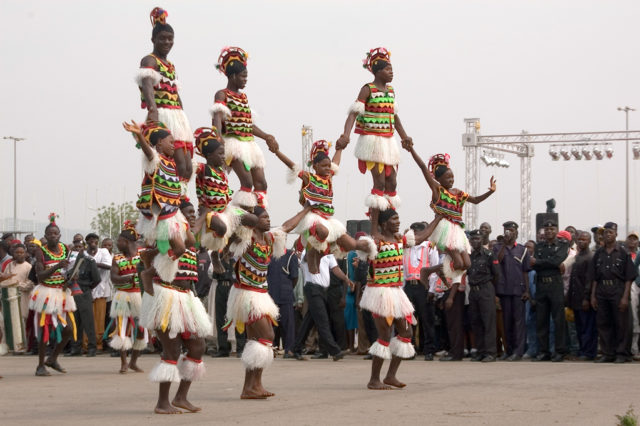

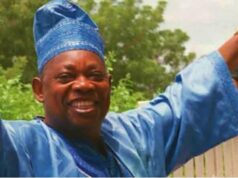
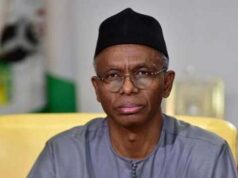



Very well articulated
True talk!